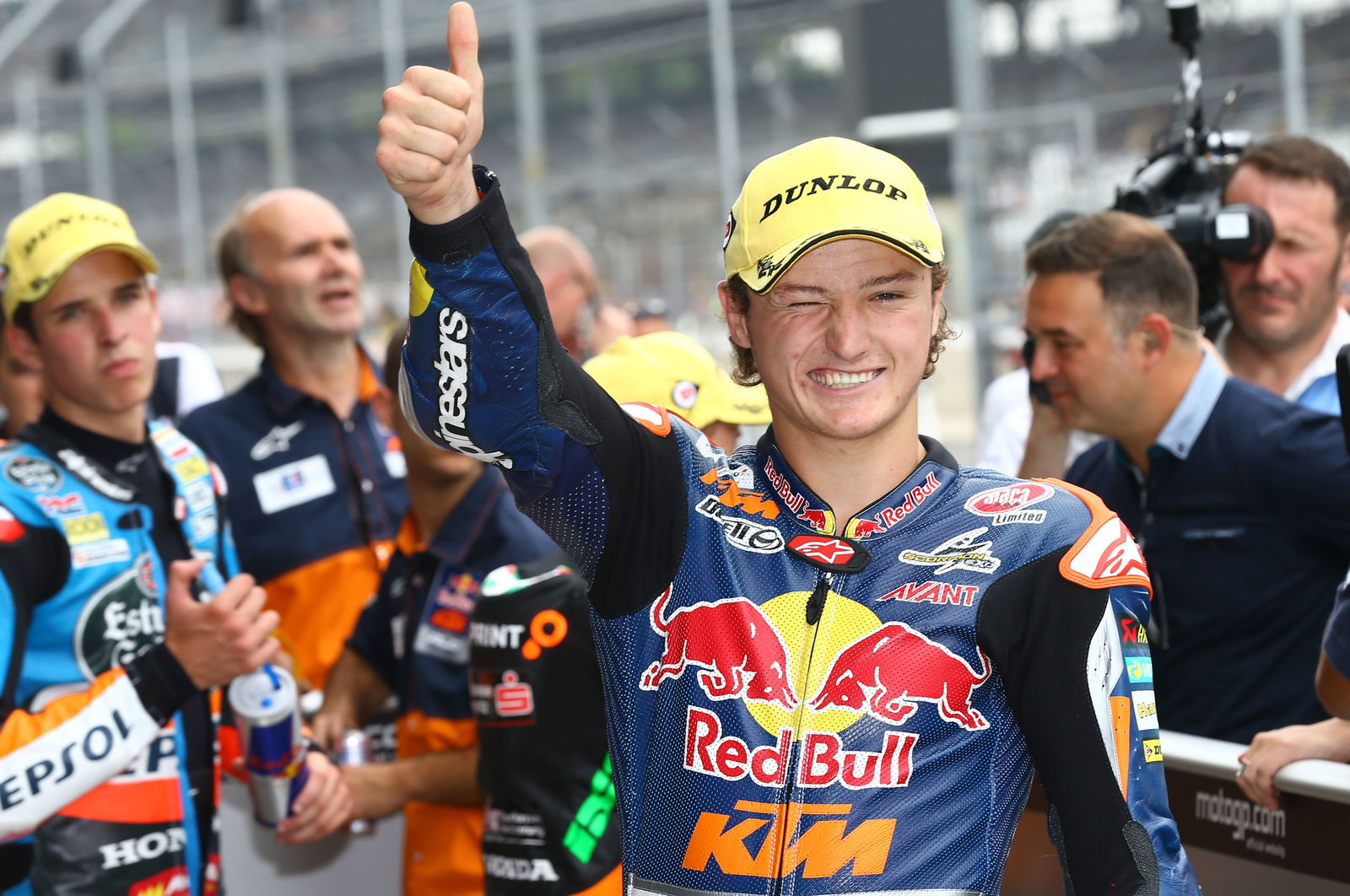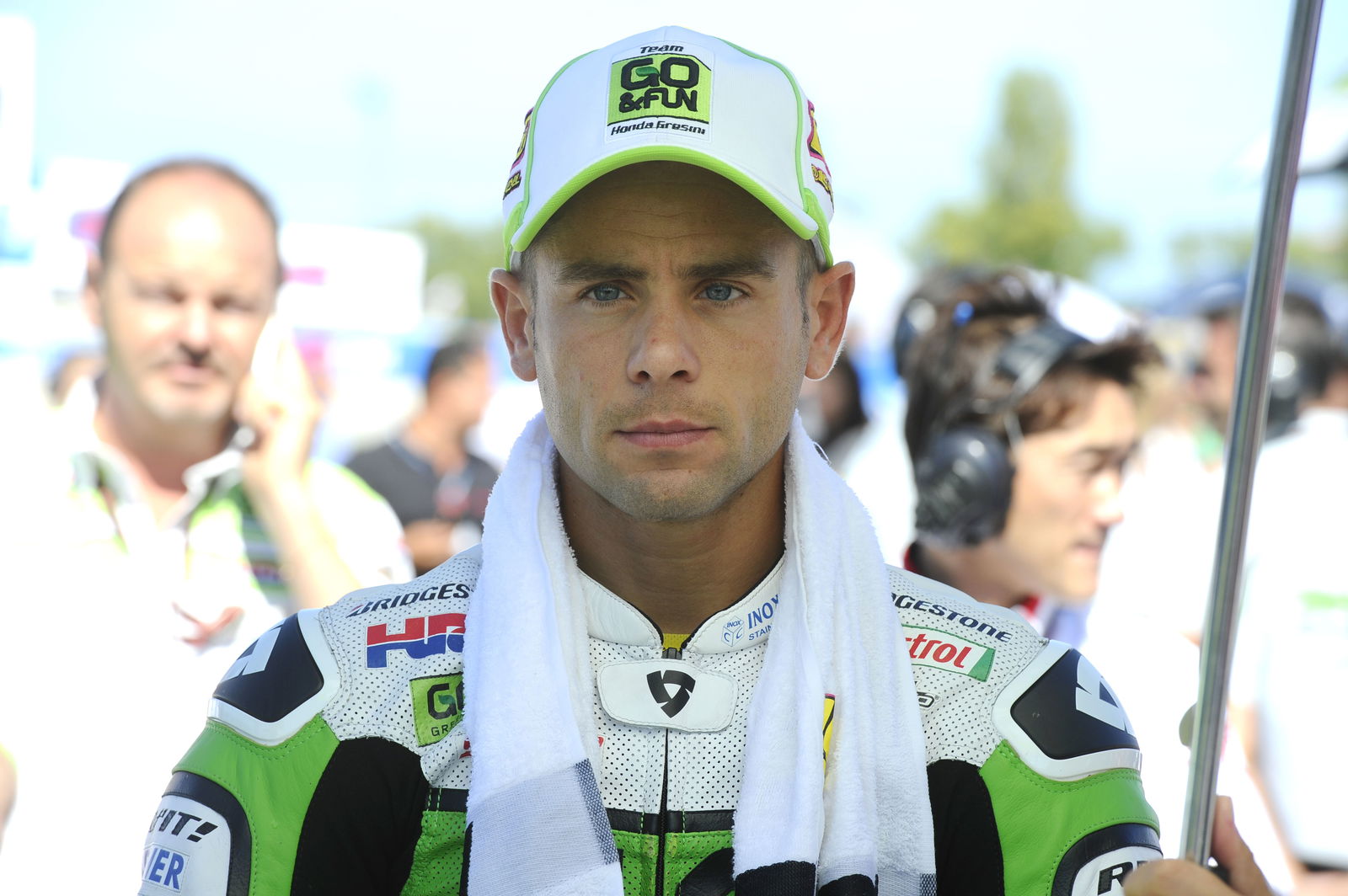MotoGP Q&A - Jeremy McWilliams

Crash.net:
Looking at Silverstone, what made you come back?
Jeremy McWilliams:
I've been asked a little bit why I took that ride on board, but when you see something as innovative as it, and ticking so many boxes for the organisers who want to see new ideas coming forward in Moto2, that was a very new idea and possibly a little bit ahead of where it needs to be at the moment.
I think that they need to get back and do some really in-depth testing with the front end. It won't change overnight but I think that with six months they could do something. They want to be in Moto2 next year and they have really taken on board what they need to do with it.
It needs a significant change to work but hopefully it'll work out and there could be a link between Taylor Made, Brough Superior and WIL Sport [New Zealand-based Sport Management and Sponsorship company].
The one good thing that came out of Silverstone was that Phil and Cheryl [from WIL Sport] met the guys behind the project and there could be a future for when Brough Superior come back with the evolution of the bike that they raced at Silverstone.
Crash.net:
Did it feel similar to Japanese MotoGP test riders lapping off the ultimate pace of the bike and so finding issues when you got closer to the limit of the bike in real competition?
Jeremy McWilliams:
Yeah, pretty much. The testing that they've been doing has been in America in an uncompetitive championship and they could shine in that arena and it really wasn't comparative to Moto2. Even for me it was an eye opener to step into that class and see how competitive it was. It's like the top five or six European Junior Cup riders the whole way through the grid!
We were never going to achieve anything and we knew that was the case before going there, but dealing with that and not letting it affect what we were doing was tough particularly with the attention of me coming back to ride a Moto2 bike that wasn't competitive.
It did feel that they hadn't achieved a lot through their testing but it also never had to be ridden in anger before either and, honestly, just to get into the 107% time in Moto2 is probably the most difficult thing for a rider that hasn't been in the class. Even on a good bike hitting 107% is a task because of the speed of Kallio, Rabat and Vinales at the front and they can just keep pushing that lap time to the point where it's nearly unbelievable.
We watched Tito in Almeria and he was doing '34s and when guys like Tom Sykes test there they just dip into the '34s with 240 bhp Superbikes! It did feel like going in at the deep end but when you sign up for something like that you've got to see it through because the only benefit is that the team can take the data away and move forward.
I've no regrets for doing it though because we can only help the programme move forward and it's opened doors for the future and hopefully we'll be involved in the future.
Crash.net:
How did it compare to racing with the team from Queens University Belfast? It's amazing to think that at that time a Mechanical Engineering department was able to race competitively in grand prix.
Jeremy McWilliams:
Those early days were much more tried and tested and coming with a proven package. The Mechanical Engineering department were pretty switched on and the Professor in charge, Robert Fleck, worked with us on the team and he was working in race teams from when I started racing in Irish Championships, British Championships, European and World Championships.
The nice thing about it was that it was an era when it was easier to secure sponsorship and they were excellent at that with partners in Australia and America for their injection systems and that enabled them to go racing. Those partnerships are becoming much more difficult to secure and find now and if it wasn't for the guys that we have here, like WIL Sport or Pata, this wouldn't be possible either.
Crash.net:
Apart from the Moto2 project with Brough Superior you're clearly very busy here in the WSBK paddock, what exactly are you doing?
Jeremy McWilliams:
One of the reasons why Silverstone came about was because of WIL Sport involvement in it. They support our 'Stock team and in particular Kyle Smith, who wouldn't be involved without WIL Sport's involvement. That's really the aim for WIL Sports, to bring young riders through in European and World level.
Crash.net:
Let's bring in Phil London, Director of WIL Sport. What was your desire for getting involved Phil? Was it to help young Kiwi riders find a way to make it in Europe or was there anything else?
Phil London:
We started back home with WIL Sport in other sports to try to help athletes with clear talent, but maybe not the resources, get into national and international championships.
We became involved in motorcycle racing through our son and a friend of his, who we sponsored until the first European Junior Cup [EJC] four years ago. Our son always wanted to ride a bike but in our family we never had any involvement in racing. Through the EJC we got involved and thought it was such a brilliant set-up and it's probably the most cost effective way to get a rider to Europe and involved with this paddock.
We've been with the Fernandez family [Augusto Fernandez leads the EJC standings] and Kyle Smith. When those opportunities come up we look at it and say, 'how can we help?' We're not agents and only offer riders some assistance to help advance their career.
Crash.net:
Where does the money come from?
Phil London:
We have some businesses back home in property management and we use that to help resource what we do here. It's great to find likeminded people to get involved but it has to be on the basis of no financial return because we don't for one. We have a joke that we have an 'NA' policy around the riders and families that we get involved with - that's basically a 'No Assholes' policy!
Not all the riders that we're supporting will become world champions but we still think that they can make a big difference in the sport. They can help bring through the next New Zealand or Australian world champions. We have a Spanish rider, a Portuguese wild card here, Kyle Smith... These riders need that opportunity.
Crash.net:
Jeremy, is Kyle Smith [dropped after nine Moto2 starts last year, two podiums in Superstock 1000 this year] your main hope for getting a rider into grand prix?
Jeremy McWilliams:
We have had discussions on how to keep Kyle within this programme because riders like Kyle are very sought after and the special riders tend to be pouched by other teams. We really don't want that to happen with Kyle and we want to keep him here as a figurehead for the other riders to look up to. If they can see a rider that we've developed and brought forward it can help motivate them so we'd love to keep Kyle on board next year.
Phil London:
Jonathan Green made a comment over the weekend about what we're doing and bringing back the amateur ethos of loyalty in this environment. So if you show support to riders where they aren't told - like has happened recently - that they don't have a ride. The riders know that they don't have to worry about next year, or the year after and they can clear their head and just focus on what they are doing on track.
Jeremy McWilliams:
At the moment, for me coming from a rider's perspective, it's not a great place for riders not performing and we'll often read on a website that a rider has been dropped because of his performance.
It's just a trend that has been taken on from Grand Prix, where riders have to meet certain points to keep their ride otherwise their contract is void. Those riders need help rather than being dumped on their backside. That's not our ethos here, regardless of how our riders perform it's about getting them to do their best.
Crash.net:
From your perspective Jeremy you could just stay back home in Northern Ireland and not get involved with these kind of projects. What motivates you to come back to the paddock and get involved in projects like this?
Jeremy McWilliams:
I don't enjoy not having something to do and I've been involved with the EJC [European Junior Cup] for years. I was busy with Supersport [with Rivamoto] but couldn't do both, so when that stopped last year it gave me a chance to work with the European Junior Cup guys and the 'Stock guys which I really enjoy.
They keep my hands full and it's a busy weekend but it's very enjoyable and there's certainly a good atmosphere here and it's a happy place to work. I do like this paddock as well. Coming from MotoGP, and it was lovely going back last week, everything is 20 times more expensive and on a much bigger scale. This is still a nice, happy, family knit team at the moment.
Phil London:
I think what helps as well is the accessibility of the top riders to the Junior Cup riders. It's great to have Jeremy here, but we also bring in guest speakers [from WSBK and WSS] to talk.
Jeremy McWilliams:
The one rider that really stuck out to me was Kenan Sofuoglu who came in to talk and he was incredible. He could name all the EJC riders because he watches them on track and he was even recalling races and where a rider came from to the front. For everyone it was amazing. They were silent and in disbelief that he was watching them that closely.







